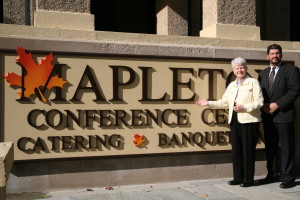From convent to conventions
Mapleton Conference Center at 52 North Broadway in White Plains wasn”™t always an event space for businesses, retreats and social gatherings. The Spanish villa was built in 1923 as dining halls for the Sisters of the Divine Compassion.
The Catholic sisters own the 15-acre Good Counsel campus, home to Mapleton and to the Good Counsel private schools. Their convent, built in 1908, is attached to the center.
The nuns never turn away guests because they can”™t afford to use the space. “People can pay what they can pay,” said Jane Keegan, associate director of advancement for the sisters. Five years ago, the sisters partnered with Caperberry Events to create a sustainable business model by offering the space for rent.

Caperberry Events president Peter Herrero Jr. said prior to the arrangement, he catered for the nuns who used the dining halls for breakfast, lunch and dinner. Since the arrangement, Herrero, who owns the restaurant Sam”™s of Gedney Way in White Plains, has provided catering through two operations: Caperberry and The Great American BBQ Co. Herrero made investments in Mapleton”™s event space, sprucing up the dining hall by buying chevalier chairs and new china sets with his own money. He said his charitable work comes from his desire to help churches serve the community.
Herrero, the son of Cuban immigrants who grew up in poverty, said he always knew hospitality was his passion. He wanted his three daughters to have the experience of “walking in someone else”™s shoes” and pushed them to volunteer for soup kitchens and other food services. He himself cooked for the hungry at church functions and said “this was the only type of work that allows people to meet on a very personal level.”
The revenue generated through the conference center helps support the convent”™s mission to provide educational and counseling programs for impoverished people throughout upstate New York, Westchester, and the Bronx.
The conference center hosts 30 events a year and can accommodate up to 300 people at a time. Events range from wedding receptions and bar mitzvahs to personal retreats and funeral services. The spaces include two large dining halls with screens, projectors and speakers and a breakout room where a line often forms from the entrance of the door to the buffet table.
“This was our way to bring people into our space to learn about our work and earn some revenue,” Keegan said. “It”™s a means of hospitality and a way to advance the mission of the organization.”
Sister Mary Veronica, a former socialite, started an outreach program for children living on the streets of lower Manhattan in the 1890s. She later decided to move her trading school to White Plains as the program evolved and the number of students grew, Keegan said.
“The founders came to White Plains and thought the children needed some fresh country air, so they would send them up north by train.” she said.
Veronica asked John Tilford, who once owned the Good Counsel property, to sell his estate. She wanted to turn the lodging space for socialites touring the countryside into a boarding school for the poor and uneducated immigrants living on the streets. But Tilford refused to give up the land for several years, Keegan said.
“Legend goes, Mother Mary Veronica planted the statue of St. Joseph in the bushes and a couple years later the 28-room house of the Tilford home and all his land was hers,” Keegan said.
Once Veronica purchased the property in 1890, the Sisters of the Divine Compassion built a chapel and schools on the property, where they taught the students catechism and work-related skills like cooking and sewing, Keegan said.
The campus today serves as an educational center for the Good Counsel Academy Elementary School, a co-ed institution with 170 students from pre-kindergarten through eighth grade and the Academy of Our Lady of Good Counsel, an all-girls high school with 420 students. The sisters also founded the Good Counsel College in 1931, which was renamed the College of White Plains in 1972. By 1973, the campus began a gradual merger with Pace University and since 1975 it has been called the College of White Plains of Pace University.